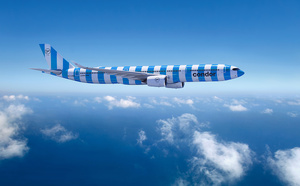These two aircraft, which were produced in June and August 2008, are fitted with Pratt & Whitney engines and will be configured with a two-class layout, with 18 “full flat” seats in business class and 247 seats in the main cabin.
The introduction of these new aircraft fits clearly into the long-haul business development strategy announced by Aigle Azur.
This strategy has been reinforced by the partnership established with the Chinese HNA Group in October 2012, which led to the latter acquiring a 48% stake in Aigle Azur’s capital.
The introduction of these new aircraft fits clearly into the long-haul business development strategy announced by Aigle Azur.
This strategy has been reinforced by the partnership established with the Chinese HNA Group in October 2012, which led to the latter acquiring a 48% stake in Aigle Azur’s capital.
Flights Paris-Beijing postponed until the first quarter of 2015
As for the flights between Paris and Beijing which were initially announced as due to start on 28th June with three flights a week on an aircraft belonging to its partner Hainan Airlines, Aigle Azur is also today announcing that this launch is being postponed until the first quarter of 2015, to coincide with its own Airbus A330-200 going into service.
Indeed, Aigle Azur once again finds itself having to cope with a stalemate as far as flying over the territory of the Russian Federation is concerned.
According to the French authorities’ interpretation, the air agreement signed between the two countries in July 2001 allows flights over Russian territory via the southern route - even with an aircraft chartered in China - whereas the Russian authorities believe that only aircraft registered in France can fly over their territory.
This being the case, Aigle Azur cannot take the risk of being held hostage to a disagreement between the two countries, at a time when bilateral relations are tense following the Ukrainian crisis.
Cédric Pastour, the airline’s Chief Executive Officer, also deplored the lack of progress in the negotiations between the European Union and the Russian Federation as far as flights over Siberia are concerned, as this situation creates an obvious distortion of competition.
Indeed, Aigle Azur once again finds itself having to cope with a stalemate as far as flying over the territory of the Russian Federation is concerned.
According to the French authorities’ interpretation, the air agreement signed between the two countries in July 2001 allows flights over Russian territory via the southern route - even with an aircraft chartered in China - whereas the Russian authorities believe that only aircraft registered in France can fly over their territory.
This being the case, Aigle Azur cannot take the risk of being held hostage to a disagreement between the two countries, at a time when bilateral relations are tense following the Ukrainian crisis.
Cédric Pastour, the airline’s Chief Executive Officer, also deplored the lack of progress in the negotiations between the European Union and the Russian Federation as far as flights over Siberia are concerned, as this situation creates an obvious distortion of competition.


























![Tourisme : où sont passés les Chinois ? [ABO] Tourisme : où sont passés les Chinois ? [ABO]](https://www.tourmag.com/photo/art/large_16_9/87929923-62307593.jpg?v=1744721842)















